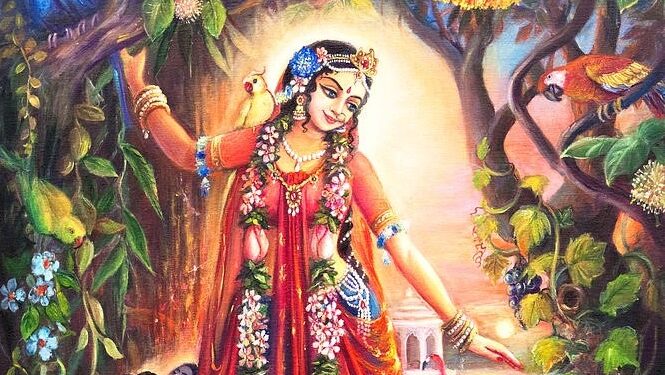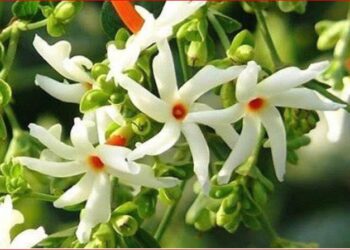When Lord Hari stopped speaking, Tulasī left her physical body, assumed a celestial form, and went to Vaikuṇṭha. Lord Hari also went with her, and there she frequented His heart, as did Goddess Lakṣmī.
As soon as Tulasī Devī quit her physical body, this body became the Gaṇḍakī River; and Lord Hari manifested Himself as the mountain on the bank of that river, giving spiritual merit to the people. The worms on that mountain cut and fashion, i.e. construct, various kinds of stones. Those that fall into the river and assume the color of clouds, without a doubt, yield results; but those that drop onto the dry land become brown by the sun’s rays and unfit for worship.
Lord Hari duly honored Tulasī and began to sport with her along with Goddess Lakṣmī. He elevated Tulasī to the rank of Lakṣmī, making her blessed and glorious. Lakṣmī and Goddess Gaṅgā allowed and tolerated this new union of Lord Nārāyaṇa and Tulasī. However, Goddess Sarasvatī became angered and could not tolerate Tulasi’s elevated position.
Once, in the presence of Lord Hari, the dignified Sarasvatī quarreled with Tulasī and hurt her. Tulasī, humiliated and insulted, disappeared. Then, out of anger, the wise and adept Tulasī became invisible even to Lord Hari.
When Lord Hari did not see Tulasī, he appeased Sarasvatī and, obtaining her permission, proceeded to the Tulasī forest-Vṛndāvana. He was very much disturbed by separation from her. There, he took a bath; then, with proper rites, he worshiped the chaste Tulasī with His whole heart, and then meditated on her with devotion, and uttered, “Obeisances to Tulasī Devī, Queen of Vṛndāvana Forest.” During the worship, Tulasī was offered a lighted ghee lamp, frankincense, sandal flowers and sacrificial offerings. Anyone who worships Tulasī in this way will achieve complete perfection.
The Lord then began to praise His glorious devotee. “The Tulasī trees collect in many groups, thus the paṇḍitas call it Vṛndā. I praise that dear Tulasī. Long ago she appeared in the Vṛndāvana forest and is thus known as Vṛndāvanī. I adore that auspicious and glorious one. She is always worshiped in countless universes and so is known as Viśvapūjitā-one who is worshiped throughout the world. I worship that Viśvapūjitā.
“Countless universes are made pure and holy by her contact. She is therefore called Viśvapāvanī-one who purifies the whole universe. Remembering her, I am suffering from separation from her. Though other flowers be heaped upon the demigods, they are not satisfied unless Tulasī is offered. Thus she is considered the essence of all flowers and is called Puṣpasārā. Now I am anguished and troubled and very eager to see her-she who is purity incarnate. I crave the favor of that goddess. Because attainment of her brings faith and joy, she is called Nandinī. O may she be pleased with Me. In the whole world she is incomparable, thus she is called Tulasī. I take refuge of that dear Tulasī. Very chaste and dear, she is the life of Kṛṣṇa and so is known as Kṛṣṇajīvanī. O may that goddess save my life.”
After Lord Hari finished the ceremony and prayers, Tulasī was pleased and came out of a tree. She immediately took refuge at Lord Hari’s lotus feet. He blessed her by saying, “O Tulasī, you will be worshiped by all throughout the world. Dearest, I will hold you on my head and in my heart; and all the demigods will hold you on their heads.”
When Lord Hari saw that the dignified Tulasī was weeping because her feelings had been hurt by Sarasvatī, He clasped her to His breast, took her to Sarasvatī and reconciled their differences. Then He blessed Tulasī, saying, “You will be worshiped by all, honored by all, and respected by all. And all will carry you on their heads. I also will worship, honor and respect you and carry you on My head.”
Tulasī was now very happy. Sarasvatī then embraced her and seated her by her side. Lakṣmī and Gaṅgā, smiling, also hugged her, and then took her home.















